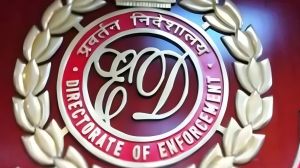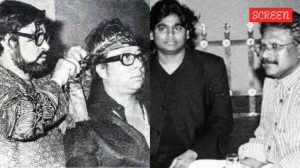The young and the responsive
Sit like this, dress like that, talk softly, walk properly – the social stereotyping, conditioning, prejudices, trolling, catcalling continue, and while the teens and young adults of the Tricity are subjected to it, they refuse to give in.
 Tara Khanna with (right) Anusha Verma and (right) Nandini Bhan. (Express Photo)
Tara Khanna with (right) Anusha Verma and (right) Nandini Bhan. (Express Photo)“THIS is war! Let’s go out and kill the other team. Man up! You’re playing like a girl.” The misogynist tone of coaches at football and basketball practice on the courts rattles 17-year-old Ananya Kamboj, who has been playing for her school and club teams since childhood.
“It’s an attempt to motivate the team’s performance, but by hurling such statements, they are indirectly sending a message to regard girls as inferior to boys,” feels Kamboj. In spite of unparalleled achievements, women and girls are looked at as sex objects, and often applauded for their commitment to heterosexual domestic mothering roles, she adds with razor-sharp clarity. Keep the tone down, speak like a girl, is something that 18-year-old Tara Khanna would often be told before stepping onto the podium for a good ol’ round of debate and declamation. “Although I am privileged in many ways, and live in a great city like Chandigarh which is considered safe by all standards, I am still stared at, and have to be careful how I look, walk and talk,” says Khanna, who has worked with NGOs for women rights and uplift and is all set to pursue psychology, and women and gender studies.
🗞️ Subscribe Now: Get Express Premium to access the best Election reporting and analysis 🗞️
Sit like this, dress like that, talk softly, walk properly – the social stereotyping, conditioning, prejudices, trolling, catcalling continue, and while the teens and young adults of the Tricity are subjected to it, they refuse to give in. Gender empowerment, equality, equity, rights are not mere terms these young ones are taking lightly. March 8, International Women’s Day, is just not another day for them. It’s a day symbolic of the struggles of women, of those who’ve broken barriers and continue to shatter ceilings. “It’s a day we should all pause, reflect and celebrate what women have achieved as a gender, to continue to actively support and motivate one another, regardless of gender,” says Kamboj, and author of the book, ‘My Journey from Mohali to St Petersburg.’
Kamboj is also part of Girls Rise Mohali, a community working for women’s equality and empowerment, and has been selected as a young journalist at Football for Friendship (F4F) programme. “I believe that women have always been strong. The strength is right within them,” says Kamboj, who views feminism as a movement to put an end to sexism, sexist exploitation, oppression and to achieve gender equality in law and in practice. “Sexism applies to both men and women. Women are affected more. Everyday sexism takes different forms — telling jokes about girls, commenting on the female body, reacting to the way women are dressed or objectifying women,” says Kamboj.
Society is slowly accepting that women too have rights and a voice that can’t be suppressed with ‘moral’ codes of conduct. “Most girls can do what they want to, but getting there is a struggle. The family will still keep checking on the girl. It’s rarely the case with boys. We are ‘allowed’ to do things, we are supposed to take ‘permission’. That, I feel, is not empowerment, because it still has patriarchy calling the shots,” says 24-year-old Hiteshi, who works with a Mohali-based NGO, Generation Savior Association.
Seventeen-year-old Nandini Bhan agrees. “Gender, sex, all this is hardly an issue with our friends, our age group. We call out to those who discriminate, but it’s not the case in the family or society. From our wardrobe to mannerisms, to conversations, everything is under scrutiny. When we work, we don’t have pay parity, we are still considered the weaker sex, and according to statistics, we are not even close to equality,” says Bhan, who resolves to effect change by pursuing a career in law. “If we need change, then there have to be more women in legal practice, in policy-making, which is not the case at present. Career choices too are discriminatory – teaching, nursing jobs simply just can’t be for girls,” says Bhan.
It took a fair amount of convincing but Anusha Verma and her pals managed to bring the United Nations Foundation’s initiative, Girl Up, to their school Sanskriti in New Delhi.
“GirlUp Moksh is a club under GirlUp campaign and it works towards creating paths for free and open communication, gender awareness, inclusivity,” she says. From Chandigarh, 18-year-old Verma acknowledges the progress so far, but there are miles to go. “We forget how much class and caste divide affects lives, especially women’s respect and rights. Activism today is merely performative. Actions have to speak louder,” says Verma. Often chided for being too radical or opinionated for her ‘age’, Verma prefers to listen and speak her mind. Under the Girl Up initiative, she and her team are not afraid to broach difficult subjects and break them down for younger teens. “For instance, there are pronouns beyond he/she. We are now living in an increasingly non-binary world. By talking about it in a safe space we are able to break barriers. The society is conditioned to react in a certain manner,” says Verma, who is pursuing humanities, and plans to take up law.
“People should have the freedom of expression, the right to live with free will,” 15-year-old Sohrab Singh lends a balanced perspective. It’s time, he observes, to cut through the archaic cultural practices. “More than equality, women need equity to be at the same level of development,” he says, troubled by how most males are products of the toxic masculine culture they are raised in.












